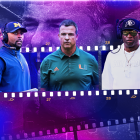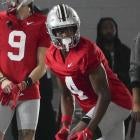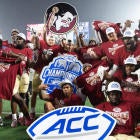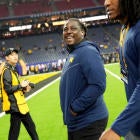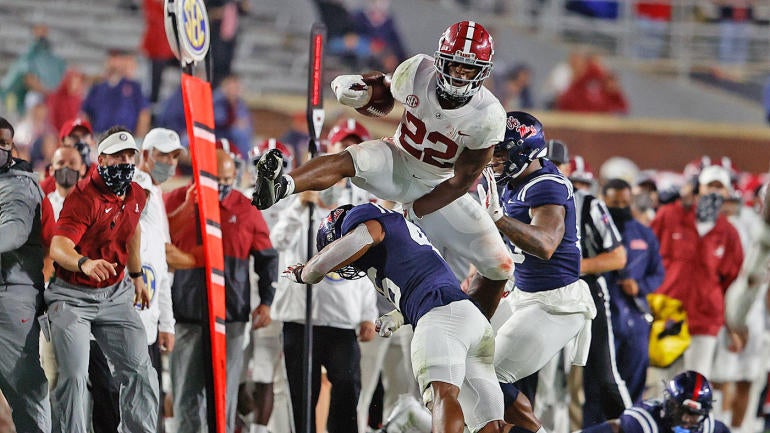
Out on the West Coast, Urban Meyer fielded a predawn call Sunday while waiting to fly out of Los Angeles following his Fox TV duties. While sleep was still in his eyes, one of the first thoughts to cross his mind were those of a wide-eyed coach on alert.
Hours earlier, Alabama had beaten Ole Miss but needed every one of its 743 yards to do it. Lane Kiffin had just conducted a play-calling clinic against his former boss, Nick Saban. The teams combined for the most yards ever in a regulation SEC game.
During the contest, you could almost see the curse words coming from behind Saban's mask.
"I don't want to be in that staff meeting this morning," Meyer said. "I saw him on the sideline. [Defense], that's his baby."
Not only Saban, but the entire SEC. On Saturday, the league gave up part of its identity and -- let's face it -- part of its manhood. Defense is a foundation of the SEC's "It Just Means More" culture.
The so-called line-of-scrimmage league now needs to file a flight plan. Four of the top five passing offenses nationally are in the SEC. So are four of the bottom 12 defenses.
That kind of statistical dichotomy has likely never occurred in the Strength Everywhere Conference.
- Alabama is picking up the defensive pieces after allowing the second-most yards in its history in a 63-48 win. Surprisingly, that's nothing new. The Crimson Tide have allowed at least 42 points three times in the last eight games. Before that, it had allowed 42 points three times in the previous 65 games. "I don't know if they had our signals or what," Saban said of Ole Miss. It didn't, unless a future hall of fame coach known for being so meticulous he has a game plan for a rain delay has suddenly lost it.
- The Rebels are the ultimate boom and bust. Left with little defensive talent, Kiffin in his first season at Ole Miss hasn't hidden the fact his Rebels have to outscore everybody. Opponents are scoring a touchdown once every 10.4 snaps. Alabama quarterback Mac Jones had more pass completions of at least 20 yards (seven) than incompletions (four). "I joked with Coach [Saban] afterwards," Kiffin said. "'I thought they played defense in the SEC.'"
- Florida has given up 100 combined points in a three-game stretch following a 41-38 loss at Texas A&M. The Gators have now allowed at least 540 yards twice since 2015 -- both in the last three weeks -- in the opener against Ole Miss (613) and Saturday at Kyle Field (543). With 14 touchdown passes through three games, quarterback Kyle Trask is on pace to blow by Joe Burrow's season record of 60. "That's our goal every time we're on the field is to score every time we have the ball," Trask said. With opponents blowing by the defense, the Florida offense may have to do just that.
- Texas A&M's D can't gloat. It is allowing 6.75 yards per play. That would be a school record. What's worse is three SEC teams are behind them -- LSU (7.0), Vanderbilt (7.25) and Ole Miss (8.79, dead last in FBS). Florida (6.32), Missouri (6.26) and Alabama (6.0) are also among the worst nationally.
- LSU gave up 45 points (and the game) to a Missouri team missing seven players in its two-deep depth chart due to COVID-19 concerns. The Tigers became the first defending national champion to fall out of the AP Top 25 since Auburn in 2011. That was two weeks after LSU surrendered an SEC-record 623 passing yards to Mississippi State's KJ Costello in the opener.
"In the Big 12, it's become kind of an expectation" Meyer said. "In the SEC, I never thought it would be. I remember when I was there how hard it was to get a yard, let alone 600."
Some might suggest it's time for the SEC to take a pie in the face, the same one its fans and pundits threw at the Big 12 all these years. "Gimmicky," they called those Big 12 offenses. "No defense," they said. "Un-American, sub-par football," they screamed from the Deep South tailgates to the call-in shows.
Payback's a witch, SEC. Or maybe this is just the way of the football world right now. The nation's offensive trend has bled into the Southeast like, well, a virus. That's part of the reason for this change but not the whole reason.
When Texas and Oklahoma combined earlier Saturday for the most points ever in the Red River Showdown (98), we expected it. The game went four overtimes and it was, after all, the high-scoring in series history.
"The game has changed," Oklahoma coach Lincoln Riley said. "The aggressiveness of it has changed. Not that you can't have these dominant defensive performances, but the chances you're going to be able to do that game in, game out against elite competition is not as good. I don't think there was a moment. I think it was constant evolution."
Welcome, then, to the SEC's moment of Darwin.
It dawned on a lot of us Saturday when nine of the 14 SEC teams playing scored at least 30 points. Those 14 teams averaged 31 points. Pro Football Focus noted this week that SEC teams are passing almost 58% of the time. That's up from less than 51% in 2014.
The gnawing conclusion in the South is that defense might not necessarily win championships anymore.
"What a lot of people have seen, it's going to be very difficult to win a championship if you're not able to score some points and go on some of those runs," Riley said. "Eventually, you're going to run into somebody who is going to score a few points on you."
Saban created this monster, at least lately in the SEC. When Alabama's coach decided to hire Kiffin six years ago and go to the spread offense, Frankenstein was already on the slab. All Kiffin did was flip the switch and bring the beast -- and his career -- to life.
In Kiffin's first season (2014), Blake Sims, a converted running back and receiver, set the Alabama total offense record as a quarterback. The Tide won the national championship in 2015.
It can be argued that, if Saban didn't embrace those spread concepts, he wouldn't have be able to recruit Tua Tagovailoa and a slew of NFL-grade receivers. The Alabama dynasty continued and flourished in a new, more entertaining way.
The success legitimized the quirky Kiffin to the point he was able to land the head coaching jobs at FAU and Ole Miss. In hiring Kiffin, Alabama became sort of what Saban once criticized. Remember Saban's critique of no-huddle offenses in 2012?
"Is this what we want the game of football to be?" the coach asked in 2012.
By embracing those hurry-up, spread concepts, Saban embraced everything that goes with it. For example, in some cases, that leaves the defense on the field longer. Quarterbacks have been trained to get rid of the ball before any defender can reach them. Who knows, maybe the SEC is losing its grip on landing the best defensive lineman growing up in their backyard.
Eventually, it has all leaked into the SEC -- even if some don't want to admit it. Offense became the emphasis.
"I think there's creativity," Meyer said. "I think there's some really good offensive coaches out there. Defenses are faced with so many multiple offenses they face nowadays. It was a cookie-cutter world for a while. In the SEC, it used to be I-formation. Then we got [to Florida] and went to the spread. Now, it's so multiple."
The difference being that, in 2005, Meyer had to adjust to the SEC. Now the spread is changing the SEC. Meyer recalled having a staff meeting after Florida was held to 239 yards in a loss to LSU his first season.
"We really played without a tight end, fullback," Meyer said. "We had to change our style because of that reason."
Try to find a fullback these days in the SEC. When Eli Drinkwitz arrived this season, Missouri became at least the ninth conference school to use predominantly zone-read spread offense concepts.
In general, coaches have been switching some of their best athletes to offense because of the revolution. It's not too hard to imagine LSU's 6-foot-5, 250-pound super freshman tight end Arik Gilbert as a rush end.
A way for offensive football to be played year-round at the youth level, 7-on-7 emerged long ago. COVID-19 has limited not only practice time but the ability to play. The Vanderbilt-Missouri game postponed Monday was the 28th such game impacted this season.
Less practice means less tackling, which in turn puts defenses behind the proverbial 8-ball coming out of practice into regular-season games being played against conference competition.
"It's obvious the fundamentals … you can tell," said veteran defensive coordinator Phil Bennett. "You don't have to be a defensive coach or any coach to realize that the tackling right now is extremely poor. They're not taking good angles. Nobody is wrapping up. They're trying to push people down. Usually in college you see a better job, especially with Nick Saban teams."
Instead of points surrendered, Bennett prefers to look at points per possession by the opponent. In 2017, there were three SEC defenses in the top 10: Alabama, Auburn and Georgia. So far in 2020, only Georgia (0.79 points per possession) is in the top 18.
There are three SEC teams among the bottom nine in that category (Florida, Texas A&M, Missouri). All three are allowing more than a field goal to their opponents per possession.
The SEC downturn is littered with irony. The last time LSU started 1-2 was 1994 under Curley Hallman. That team with Bennett as defensive coordinator led the SEC in total defense and was ranked 11th in the country (291.9 yards per game). Missouri gained 379 yards in the first half Saturday against LSU.
No surprise four SEC teams are ranked in the top 12 of the AP Top 25 this week. What is surprising is two of those four teams are in the bottom 11 of the nation in total defense -- Florida (fifth-worst) and Alabama (11th-worst).
Georgia is the only team in that category in the top half of the 76 teams currently playing. The Bulldogs are ranked second nationally, allowing 236 yards per half. That's less than half of what Alabama is allowing (473).
Alabama vs. Georgia on Saturday is not only the biggest game in the SEC this season -- it is the SEC on CBS Game of the Week after all (6 p.m. ET) -- it may be referendum on which way the conference's identity is heading.
Both coaches are defensive masterminds. Only one the defenses (Georgia) is playing at an elite level. Alabama remains favored by six points, according to William Hill Sportsbook.
There may no turning back. If the numbers hold nationwide, this would highest-scoring season in history (30.3 points per team). That record has existed since only 2016. In fact, the top 10 highest-scoring seasons have all been posted since 2007. The sport is also on pace for record passing (61.45%) and yards per pass (7.54).
Last season, LSU had the third-worst defense of any national champion in the wire-service era (since 1936). For the first time in the College Football Playoff era, all four participants (Ohio State, Clemson, Oklahoma, LSU) finished in the top six in scoring.
Five of the 10 all-time worst defensive performances by a national champion (yardage and points allowed) have occurred since 2010. None of those five finished lower than seventh nationally in scoring.
Alabama seemed to have problems not only stopping Ole Miss but getting lined up correctly. Rules allow for defenses to substitute if offenses make changes during hurry-up. Coaches like Kiffin do little substitution, sometimes putting that defense in conflict. Not only is the D tired, but the wrong personnel might be out there.
Alabama defensive coordinator Pete Golding addressed that issue before the season.
"The difference in the game now is the LSUs of the world is they'll go 'tempo' [fast-paced], but they'll go look [to the sidelines]," Golding said. "If you're in the same defensive look, they're going to eat you alive."
Golding also said of that 46-41 loss to the eventual national champions last season: "I have no regrets. I coached my ass off."
Saturday's landmark result might actually trace its roots back to the turn of the century at USC. While still in their 20s under Pete Carroll, Kiffin and Steve Sarkisian were together for five years. They won national championships and coached Heisman Trophy winners at USC. Sarkisian succeeded Kiffin as the Trojans offensive coordinator in 2007.
They met again Saturday with Sark in his second go-round as Alabama's offensive coordinator. The pair of master play callers accounted for a combined for 111 points, 68 first downs and 1,370 yards.
"I wish Sark wasn't over there and they were running the old Alabama offense," Kiffin said.
Kiffin's time as a college coach kind of brackets the offensive revolution of the last decade. At Tennessee in 2010, Kiffin's Volunteers lost a 12-10 grinder to the Tide. That game featured five field goals and a touchdown. It was decided when Alabama lineman Terrence Cody blocked what would have been a game-winning field goal.
On Saturday, Kiffin felt compelled to try to two onside kicks to steal a possession. Both failed.
"What's the difference if we give them the ball at the 50?" Kiffin said. "They weren't stopping us. We weren't stopping them."
Some of it we should have seen coming. Saturday's clash in Oxford, Mississippi, featured the fourth-worst third-down defense against the second-worst third-down defense. Predictably, Alabama converted on 6 of 7 third downs.
Kiffin applied even more pressure, converting all four fourth-down attempts into eventual touchdowns. Those 28 points represented more points than 25 teams are averaging per game.
Resistance may have become futile when it comes to explosive plays. The game has married itself to those as a key element for winning football. For these purposes, we'll define explosive plays as runs of 12+ yards and pass completions of 18+ yards.
Since 2017, the Power Five leaders in that category are a sampling of regular playoff teams. Three of the top four in that category are Oklahoma (leading the country with 554 explosive plays, 12.04 per game), followed by Clemson (471) and Alabama (469). Georgia is sixth (411) and Ohio State is seventh (403).
It's easy to see what they have in common -- the College Football Playoff. Those four teams have accounted for 14 of the 24 available spots in the CFP.
Riley has made to the CFP each year he has been a head coach. He decided it was decided it was easier to make big plays than grind it out.
"It's difficult against good competition to maybe go out and rattle off 10 really good 6-yard plays in a row," Riley said. "… The stats that we look at are the chances that you have of scoring when you have an explosive play in the drive versus when you don't. They are staggering."
Staggering is also a good way to describe SEC defenses limping toward whatever finish line awaits them.













